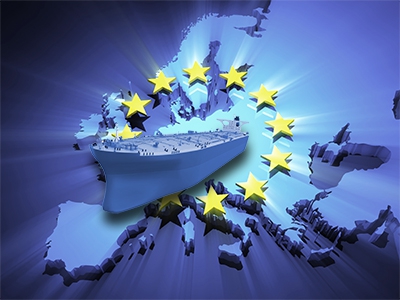The direct, indirect and induced impact of the shipping industry
Oxford Economics issued a report on the economic value of the EU shipping industry stating that EU remains thepacemaker of the world’s shipping industry.The Oxford Economics report shows that the EU controlled fleet currently represents around 40 per cent of world’s gross tonnage.
This study estimates the economic impact of the shipping industry across three channels: the direct impact of the shipping industry itself; the indirect impact of shipping firms expenditure on inputs of goods and services from their EU supply chain (such as port services, ship repairs, insurance, and shipping-related financial and legal services); and the induced impact of spending by employees in the shipping industry and its supply chain.
| Direct impact |
|
| Indirect and induced impacts |
|
| Total economic impact |
|
“Although shipping has seldom been in the limelight, it never ceased to play a substantial role in Europe’s economy” commented Patrick Verhoeven, ECSA Secretary General on today’s release of the Oxford Economics study on the economic value of the EU shipping industry.
He added: “The EU shipping industry continues to stay its ground in these hard times against fierce competition from third country shipping centres, particularly those in Asia and the Middle East. It remains today a world leader and an important source of revenue and jobs in Europe.“
Between the start of 2005 and the start of 2014, the EU controlled fleet expanded by more than 70 per cent in tonnage. The EU also controls 60 per cent of the world’s container ships in gross tonnage terms. Within the EU controlled fleet, the strongest growth between 2005 and 2014 was recorded amongst offshore vessels.

As for its total economic impact, in 2012, the European shipping industry is estimated to have contributed 145 billion to GDP, employed 2.3 million workers and generated tax revenues of 41 billion. The industry directly employs more workers than the aviation sector. Between 2004 and 2012 direct employment grew by 22%. Moreover, EU shipping is far more productive in terms of GDP generated per worker than the EU average.
Please click on the image for a larger view (Infographic Credit: Oxford Economics)
The study also highlights the causal link between EU controlled fleets that have managed to grow despite a particularly stormy recent period and EU-approved state aid measures to support shipping, most notably in the form of tonnage tax. According to estimates, the abovementioned economic contribution of EU shipping would have been much less prominent, possibly half as important as the one recorded in 2012 if those state aid measures had not been introduced by several EU Member States since the late 1990s.
The economic importance of trained seafarers
It is essential that seafarers are properly trained and have a thorough understanding of the intricacies and complexities of working in a maritime setting. This is important in terms of safety, efficiency and ensuring the maritime environment is protected. Ultimately, it is the professionalism of seafarers that ensures the smooth running of the shipping industry and, in turn, global maritime trade.
The training of seafarers also brings benefits away from ships and ports. Their skills are highly valued by firms in the wider cluster of maritime-related industries across Europe, as outlined in a 2009 study by the Copenhagen Center of Shipping Economics and Innovation27. An earlier survey by Gardner et al.28 in the UK showed that for around 16,000 jobs it was preferred to hire a former seafarer and considered essential for half of these positions.
More broadly, seafarers enjoy a genuinely international career and in an increasingly globalised world such experience is highly valued beyond maritime-related companies.
For more information , please read the study ” The Economic Value of the EU shipping industry” issued by Oxford Economics for ECSA



































































